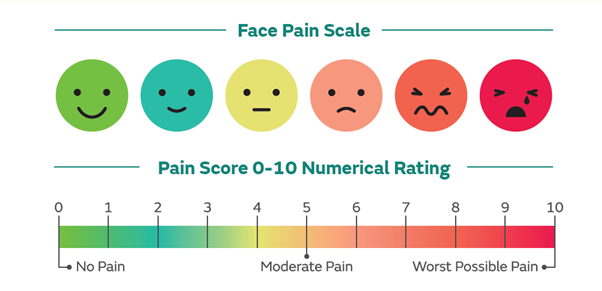Pain Management for your child after surgery
This leaflet will provide you with information about pain management for your child following surgery in Sidra Medicine.
Most children need pain management following surgery. Your child has the right to have their pain evaluated and treated as effectively as possible. Your child’s healthcare provider will assess your child’s pain and prescribe pain medicine as needed. It may not be possible to relieve all pain, however, your child will be supported and cared for. You can help your child by:
- Being supportive and staying with them in the hospital. Most importantly,
- Inform the healthcare team if you notice any signs of pain or discomfort in your child.
How is My child’s pain assessed?
Children express pain differently from adults. A special scale may be used to help your child describe pain. The scale may have facial expressions or numbers. Your child maybe shown a picture of faces (below) and asked to match their pain to the face representing their pain. Changes in physical and emotional behavior can also provide clues to pain level in babies and children unable to describe their pain.

Will my child have pain after surgery?
your child may experience some pain and will receive pain relief medicines during surgery but these will gradually wear off after a few hours.
Your child may experience different types of pain when the pain relief medicines wear off:
- Pain at the site of surgery: Your child may have pain at the site of the surgery and may need pain relief medicines regularly for the first few days.
- Other pain including: It is common after surgery to have mild pain to the throat or a mild headache but this usually goes away after a few days.
How will my child’s pain be managed after surgery?
If your child will go home the same day as the surgery:
- Your child doctor and nurse will provide you with information about pain relief medicines to be given at home and how to give these.
- Refer to the table at the back of the booklet to understand when and how to give the medicines.
If your child is required to remain in the hospital after surgery:
- Your child’s nurse on the inpatient unit, will give regular pain-relieving medicines either through an intravenous cannula or in the form of liquid or tablets.
- Your child may also need advanced pain management such as a Patient controlled analgesia/Nurse controlled analgesia or epidural infusion
- Your anesthetic doctor will discuss with you and provide the appropriate leaflet for you to read.
- When it is time for your child to go home, you doctor and nurse will provide you with information about giving pain relieving medicine at home or will fill in the back section of this booklet for you.
What can I do to help?
You can help your child by:
- Being with them and supporting them through the recovery period.
- Helping the nurses assess your child’s pain.
- Providing encouragement to you child when taking prescribed medicines and during walking and moving from bed.
- Reducing your child pain experience with simple distraction methods such as cuddles, playing games, watching videos and talking with them.
- Requesting Child Life Specialist to help with providing some toys/games and distraction techniques both in the day surgery unit and in the inpatient units. Ask you child’s nurse about this service.
Treating pain without medicine:
| Babies and toddlers | Older children |
|
|
The Pain Team
The hospital has a team of Specialist pain nurses and anesthetists, who help to look after children who may be in pain after their surgery. They work closely with nursing staff to make sure that children are as comfortable as possible.
If you have any questions about pain control, please ask a member of the nursing staff. If they cannot answer your questions, they will contact a member of the Pain Team.
What should I do when we go home?
Before your child is discharged from hospital the nurses will check that your child is comfortable. They will explain to you what types of medicine to give at home and how to give it. Your child may need to have medicine such as paracetamol or ibuprofen regularly for a few days to keep them comfortable. If you have any concerns, please speak to your child’s doctor or nurse
Using medicine safely:
- For children 2 years of age and older, check the label to see how much medicine to give. Use your child's weight to determine the dose. If you don't know your child's weight, go by your child's age for the dose amount.
- Never give adult medicines to children.
- Never give aspirin to anyone younger than 18 who is ill with a fever, unless approved by the healthcare provider.
- Never give your child another child's prescription medicine.
- Only use the dosing device that comes with the medicine.
- Keep medicines out of reach of children. If possible, store medicines in a locked cabinet away from children and teens.
- If you think your child has taken too much medicine, contact Poison Control right away on 4003 1111
Go to the Emergency department if:
- Your child is under 2 years and has a fever.
- you have any questions about your child's medicines
Pain Medicines for…………………………………………………………………………………………………………………………..
*to be filled by your child’s doctor, nurse or pharmacist before going home.
| Medicine Name | Dose | How often it can be given | Time of last dose in Sidra Medicine | Comments |

